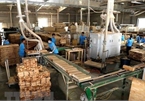Struggling to survive
The Vietnam Chamber of Commerce and Industry (VCCI) found that 35,000 businesses left the market in the first three months of the year. The number of businesses leaving the market was for the first time in many years higher than the number of newly set up ones.

Meanwhile, a survey conducted by VTV24 and CEOs Supportive Community found that 58 percent of businesses have seen their revenue decrease by 70-100 percent.
VCCI reported that 60 percent of businesses saw cash flow interruption and lacked capital, while 50 percent said they would still ‘hold out’ for half a year if the epidemic lasts a long time.
However, analysts believe in the vitality of Vietnam’s businesses. Being small and flexible, they can easily shift to other business models to adapt to new circumstances.
| F&B chains, which had ro close during social distancing, have shifted to sell food online and create new products to attract more clients. Vua Cua Restaurant (Crab King) in HCM City, instead of selling seafood, now spends three hours a day to make and sell dumplings. Coffee Bike now focuses on selling powdered coffee to retain loyal clients. |
Saigon Tourist, a travel firm, is providing door-to-door food through its network of 100 restaurants and hotels. iVivu, another tourism company, instead of laying off workers, has recruited more workers to provide lunch services. It now provides 1,000 servings a day and the figure is predicted to double weekly.
“Food demand always exists,” Nguyen Trung Cong, director of iVivu, said.
However, providing food is not a temporary business, but is part of the plan to build iVivu into a super-app which provides all essential services to users.
Meanwhile, F&B chains, which had ro close during social distancing, have shifted to sell food online and create new products to attract more clients. Vua Cua Restaurant (Crab King) in HCM City, instead of selling seafood, now spends three hours a day to make and sell dumplings. Coffee Bike now focuses on selling powdered coffee to retain loyal clients.
“Instead of selling drinks, we now focus on selling coffee to people who want to make coffee at home. Struggling to survive is the top priority task for us now,” said Hoang Tien, the founder of Coffee Bike.
Optimism
In a survey by the Vietnam Young Entrepreneurs Association of 350 businesses on solutions to cope with Covid-19 for the next three months, 42 percent of businesses mentioned finding new markets as an important solution. Only 4 percent mentioned raising selling price, 5 percent mentioned sale of businesses, and 25 percent said they would suspend business.
According to Pham Thai Binh, a retail expert, using high technology in production and business to optimize costs will become essential. He advised businesses to take advantage of this opportunity to accelerate digital transformation.
Linh Ha

Vietnamese SMEs face cash flow problems amid Covid-19
Many Vietnamese small- and medium-sized enterprises (SMEs) are facing cash flow problems triggered by the ongoing Covid-19 pandemic, stated a survey by the Vietnam Chamber of Commerce and Industry (VCCI).

Local F&B businesses take different strategies after social distancing
With social distancing measures eased, some F&B businesses have gradually restarted operations, with some even opening new branches.
 Seeking new markets, making new products and following new business thinking are actions now being taken by Vietnam’s businesses to overcome current difficulties.
Seeking new markets, making new products and following new business thinking are actions now being taken by Vietnam’s businesses to overcome current difficulties.